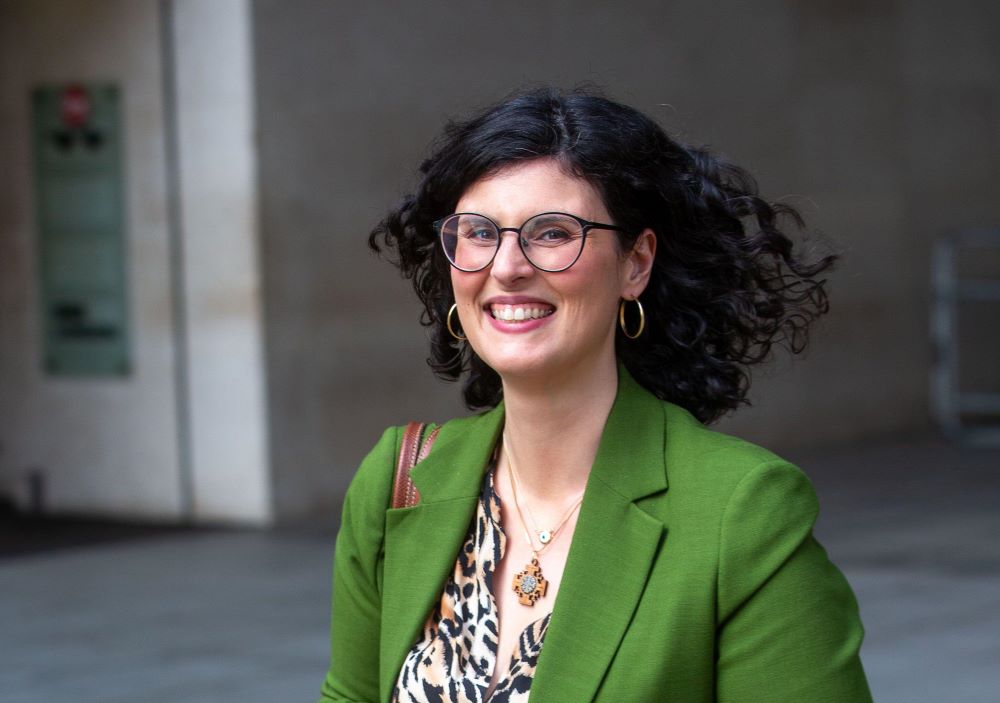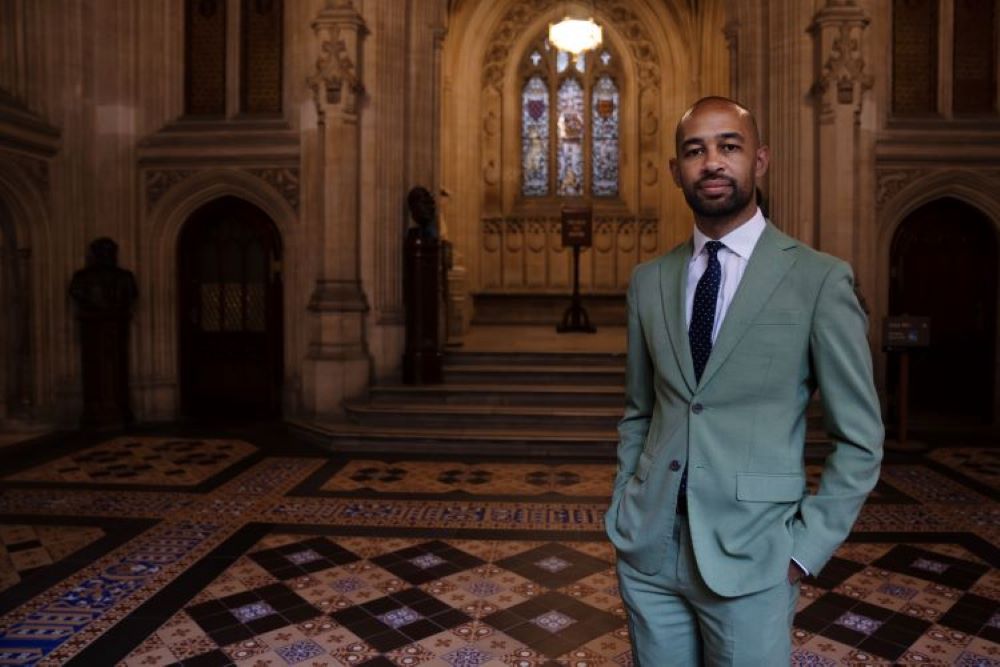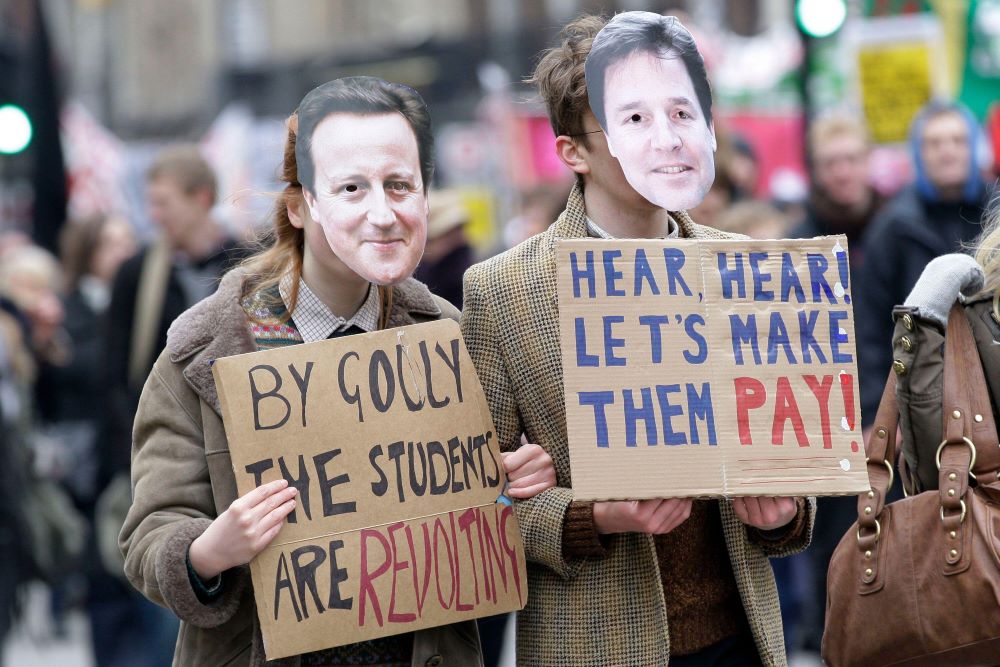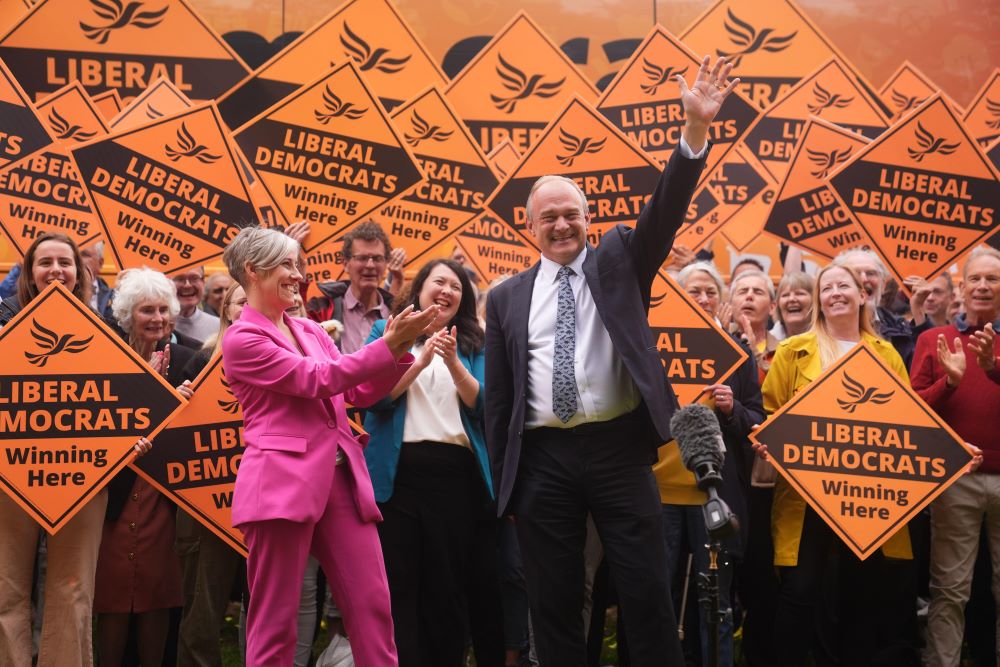Where Could Lib Dem Tribes Emerge?
13 min read
With more MPs than ever before, the Liberal Democrats have a task on their hands to keep the newly expanded party in line. Can the 72 stay united?
With 72 MPs, the Liberal Democrats are now the largest third party in history, and have returned to the third party offices they were booted out of nearly a decade ago. The challenge they now face is maintaining unity amongst their new ballooned cohort for the next five years.
“We’re not a very tribal organisation,” says Richard Foord, Liberal Democrat MP for Honiton and Sidmouth. He says he “prefers families” to tribes, though adds that it’s nothing like the Conservative Party’s five families. “It’s not like the ERG or the New Conservatives where they always seem to be competing against each other. It’s much more about interests, not rivalry.”
“If there’s a tribe, it’s more likely to be a geographic one rather than an ideological one,” argues one senior Liberal Democrat MP. With so many unknown faces, many new MPs have been sticking in “regional clusters” local to their constituency. One WhatsApp group of Surrey-based Lib Dems is called “Surrey Massive”, according to an insider.
“The phone just goes constantly,” adds the senior Lib Dem, who says they are bombarded with a flurry of questions from new MPs at all hours of the day.
“At the moment we’re incredibly united all pulling in the same direction, but as the Parliament wears on – and you’ve got a Labour government this time – it will be interesting to see where people fall on certain issues,” says Bobby Dean, the new Lib Dem MP for Carshalton and Wallington.
“This is very much a group of 72 people who are still getting to know each other. I probably knew half of the candidates elected,” adds Foord.
All 72 MPs campaigned on three core local issues which they will continue to champion now in Parliament. “Pretty much all of us sang from the same hymn sheet,” explains one new Lib Dem MP. “We had something to do with the NHS, something to do with cost of living and something to do with the environment.” The party is even united on football, with many MPs and even the party’s CEO Mike Dixon all supporting Spurs.
The party hopes to avoid having 72 ‘local champion’ MPs that aren’t united on national issues, as happened in the years prior to 2010. “When we were large before, we had lots of disparate local champions without a national thread,” a new MP recalls.
On the surface the party might appear more centre-left than the 2010 intake. “Certainly under Ed Davey I feel like we’ve become a party of the left again and certainly an anti-Conservative force again,” says Dean. “We’re much more like the Charles Kennedy-Paddy Ashdown years than the Clegg years.”
A senior Liberal Democrat MP disagrees, saying: “I think it would be simplistic to say that the party is any more left-wing now than it was under Clegg in the Coalition years.” They add: “The problem was that the party didn’t really define itself very well.”
Significantly, at this General Election the Liberal Democrats did not have to move closer to the Conservative Party to win seats. And now, with just 50 seats between them and the Tories, Ed Davey’s party has a shot at building on its success in 2029.
“We’re strong and united and they’re fighting like bats in a bag, we have an opportunity to prove ourselves to the country and be a serious, constructive, proper opposition party – that’s our platform for growth,” says one enthusiastic new MP.
Nimby v Yimby
One division is characterised as a war between Nimbys (Not in my back yard) and Yimbys (Yes in my back yard). The Liberal Democrats have a reputation of being a Nimby party as they often oppose housebuilding locally. “You’re right to identify it, because it is something that’s a dividing line within the party,” admits a senior Lib Dem MP.
Conservative Party leadership hopeful Robert Jenrick accused Layla Moran of being “the greatest Nimby in the House of Commons” last year. “She always opposes new homes, new development, new infrastructure in and around Oxford,” Jenrick added. In 2020 Moran was criticised for contesting plans for 11,000 new homes in Oxford by 2036, and last year she sent out leaflets urging voters to tactically vote Green in local elections to stop new homes being built.
Charlie Maynard, the new MP for Witney, is a former West Oxfordshire district councillor. In response to the new Labour government’s King’s Speech, he posted on X that there was “far too much reliance on housebuilding to grow our economy”. Last year, while a councillor, he wrote: “We cannot just keep accepting even more houses in West Oxfordshire… I advocate that if we don’t have a transport solution, we should fight like hell to have the absolute minimum number of houses.”
New South Cambridgeshire MP Pippa Heylings has also opposed proposals for new housing in her patch. At the time she tweeted it would “ride roughshod over local communities and our precious local environment”.
At last year’s Lib Dem conference, the party wanted to scrap its national housing target to build 380,000 new homes a year, but the membership resisted and instead backed a motion to keep it. At the time former party leader Tim Farron branded the target “pure Thatcherism”.
But senior figures in the party reject the Nimby label. “I think the whole Lib Dems are Nimbys thing is what the Tories say about us when they are trying to make a point,” argues Helen Morgan, the party’s housebuilding spokesperson. “[It’s] a complex argument in a world where politics is often black and white.”
New MP Bobby Dean, a self-declared Yimby, believes this perception “comes from the fact Lib Dems are very often in opposition in local councils”.
There are numerous examples of Liberal Democrat-run councils opposing new homes being built, however. For example, Lib Dem-led South Oxfordshire Council opposed plans to redevelop land at Chalgrove Airfield to build 3,000 new homes. Ed Davey himself has described proposals to build thousands of homes in Surrey near his constituency as “eye-watering”.
The Liberal Democrat manifesto, which pledged to deliver 1.9m homes over the five-year Parliament, stands in marked contrast to such examples of local Nimby campaigning by MPs.
But the new parliamentary party appears to be more pro-housebuilding. Eastbourne MP Josh Babarinde is a Yimby who has even given permission for a house to be built in his own back garden. “I’ve literally said yes to a house in my backyard,” he said in a recent interview with The House.
New MP for St Neots and Mid Cambridgeshire Ian Sollom is also pro-housebuilding and has welcomed the new Chancellor’s plans to “accelerate stalled housing sites”.
The activist who spearheaded the housing rebellion at last year’s party conference, Young Liberals chair Janey Little, says: “The parliamentary party is in a good place, especially with a lot of the new cohort being really solid on housing. Having lots more city MPs should help forge out a new identity – and if we go one way it would go towards more Yimby.”
Foreign affairs
Amongst the new cohort are a handful of veterans and foreign affair academics who could bring invaluable insights to the party on how best to navigate the conflict in the Middle East, as well as future wars that may arise.
Layla Moran, the Liberal Democrat foreign affairs spokesperson whose mother is Palestinian, is leading the party’s stance on Israel-Gaza and currently commands near-universal support on it.
“Gaza will not be a problem for us, Ukraine is not a problem for us – but the next conflict might be,” predicts one senior Liberal Democrat. The party’s position on the Iraq war wasn’t straightforward, they point out. “There was a lot of angst about what would happen if we, as a political party, stood against a war where we were sending soldiers into a hot conflict.”
Mike Martin, the new Liberal Democrat MP for Tunbridge Wells and a war studies professor, is also a former British army officer who has served tours in Helmand province in Afghanistan. One senior Lib Dem says he is “very impressed” by Martin. He has already struck up a friendship with former diplomat and army officer Chris Coghlan, the new Lib Dem MP for Dorking and Horley, according to one insider. The two are rumoured to be sharing a parliamentary office and may end up working closely on foreign affairs issues.
Defence spokesperson Richard Foord says he is keen to work with these new MPs. “If they’re interested in foreign policy, I have sought them out to chat to them and see where their interests lie, what they think, and what they feel strongly about.”
Al Pinkerton, the new LIberal Democrat MP for Surrey Heath, has spent the last 20 years travelling to parts of the world experiencing conflict, including Israel and Gaza. He says he is “completely aligned with Layla on the Gaza issue”.
Criminal justice reform
In his interview with The House, Babarinde is unequivocal about his desire to fix the criminal justice system and was awarded his OBE for services to criminal justice. “Most people who are incarcerated do end up coming out of prison, we need to do everything possible to reduce their likelihood of reoffending.”
The new Eastbourne MP is also friends with Labour prisons minister James Timpson, who helped Babarinde set up his company Cracked It in 2016, employing youth ex-offenders. Babarinde is keen to work with Timpson on criminal justice. “If you do the crime, you serve the time,” he insists, “but we’ve also got to make sure that we reduce their reoffending likelihood as well.”
Although this is a subject unlikely to divide the party, it is worth paying attention to Babarinde’s position on criminal justice issues as he may soon lead the party on it. Already considered a potential future leader, he is being tipped for a job in the justice team at the party’s post-conference reshuffle. “He is enormously talented,” says the party’s justice spokesperson Alistair Carmichael. “It’s just a question of when and how fast.”
As one new Lib Dem MP puts it: “Everyone knows Josh is the rising star.”
Babarinde was lined up as a parliamentary candidate for quite some time before the election and already has strong relationships with a number of his colleagues. “Me and Josh are pretty close,” explains Bobby Dean. “We first met in a co-working space for our own businesses. He had Cracked It and I had Speak Change. I’ve always admired what he’s been doing.”
But Richard Foord warns: “Talk about the next leader is putting a lot of pressure on the shoulders of people who are still finding out where the toilet is.”
Tuition fees
The university sector has urged the Labour Government to raise tuition fees to rebalance higher education funding. If a hike were put before the House, it would likely be a sore subject for the Liberal Democrats.
Two returning MPs, Tessa Munt and Andrew George, both lost their seats in the 2015 exodus of Liberal Democrat MPs when the public lost trust in the party for raising tuition fees, among other things, during their time in Coalition. There are also a handful of former university lecturers now in the parliamentary party, such as Manuela Perteghella and Paul Kohler, who may hold strong views if the issue arises.
Many of the new young Liberal Democrat MPs would have been at university age at the time of the Coalition government, some even among the first to pay the £9,000 fee. Babarinde is one new MP who protested the Coalition government’s decision to raise university tuition fees when he was 17.
The Liberal Democrat manifesto pledged a review of higher education finance in the next Parliament, but it’s unclear what their position would be.
“People like myself, who suffered the sanctimony of the Labour Party in opposition on this would not be in any way, shape or form, inclined to make life easier for the Labour Party if that’s what they do,” one senior Liberal Democrat MP says of a possible tuition fee rise.
Gender
The Liberal Democrat manifesto was committed to introducing self-ID and overhauling the gender recognition process. “We’re pretty clear in our manifesto that trans women are women. I believe that,” says Babarinde. On trans inclusion in sport, he adds: “My view, as a liberal, is that it’s the preserve of those sporting governance bodies to come and make those decisions, and I really hope that they’ll make those decisions with sensitivity.”
But one of the party’s more interesting characters, Angus MacDonald, the new Scottish Lib Dem MP for Inverness, Skye and West Ross-shire posted on X: “I am not supportive of the Lib Dem policy on trans issues. They know my opinions and respect them”. A former Tory donor, he describes himself as centre-right on economic issues and socially centre-left.
Although his views on gender differ from the party line, some believe it is unlikely he would go out of his way to cause trouble on the subject.
“He’s a very astute, capable operator,” says one senior Liberal Democrat MP. “He’s got a couple of issues where he would probably diverge from mainstream party thinking but he’s clever enough to know that it doesn’t help him to go out and campaign on these things. He is quite refreshing, actually.”
Brexit
The Lib Dems maintain the long-term ambition of rejoining the EU one day and their manifesto set out a four-stage roadmap to fix the UK’s “broken relationship” with the EU, renewing “ties of trust and friendship”. However, the party avoided campaigning on Brexit during the election and removed “stop Brexit” from their manifesto.
Monica Harding replaced former foreign secretary Dominic Raab in the once-safe-Tory seat of Esher and Walton, which voted by 58 per cent to Remain. On her website, she writes: “We’re offering voters a real way to stop Brexit by electing a Liberal Democrat majority government, which will revoke Article 50. A Liberal Democrat majority means we will have achieved a democratic mandate to Stop Brexit.”
New MP Caroline Voaden, a former MEP, writes in this edition of The House (see p21) that it is “with some dismay that I enter a House where barely anyone is inclined to say: ‘This isn’t working. Let’s make it better.’” Her colleague Perteghella, born in Italy, could not vote in the 2016 Brexit referendum that inspired her to get into politics. Both will likely be strong voices on EU issues.
Victoria Collins, new MP for Harpenden and Berkhamsted, was previously an assistant to an MEP and will bring a wealth of knowledge on Europe. She has already earned the nickname ‘Hermione Granger’ for often being found in the Parliament library, with one Lib Dem source describing her as an “extremely hard worker”. Collins has also formed a close friendship with her constituency neighbour, deputy leader Daisy Cooper. According to a senior party source, the pair have been hiring staff together and asked the accommodation whip for a shared office.
Any of these figures may push the party to be bolder on Brexit.
The Liberal Democrats may be united for now, buoyant after a strong election. But cracks could quickly start to show as the new government gets its legislative agenda underway. How the Lib Dems respond will determine the party’s success – or failure – in 2029.
One Lib Dem MP cautions: “The party’s got to be able to accommodate people with different views. It always has done, and that sort of tolerance of difference is one of the defining characteristics of a liberal party.”
